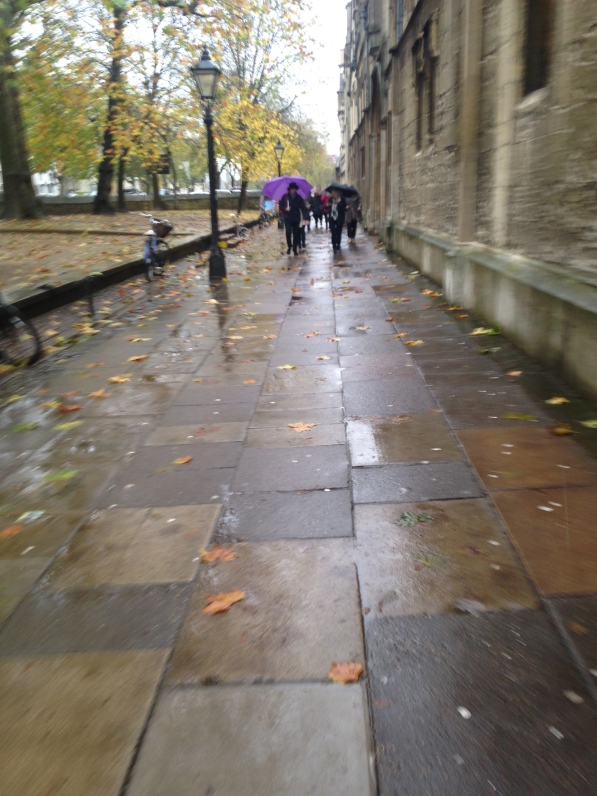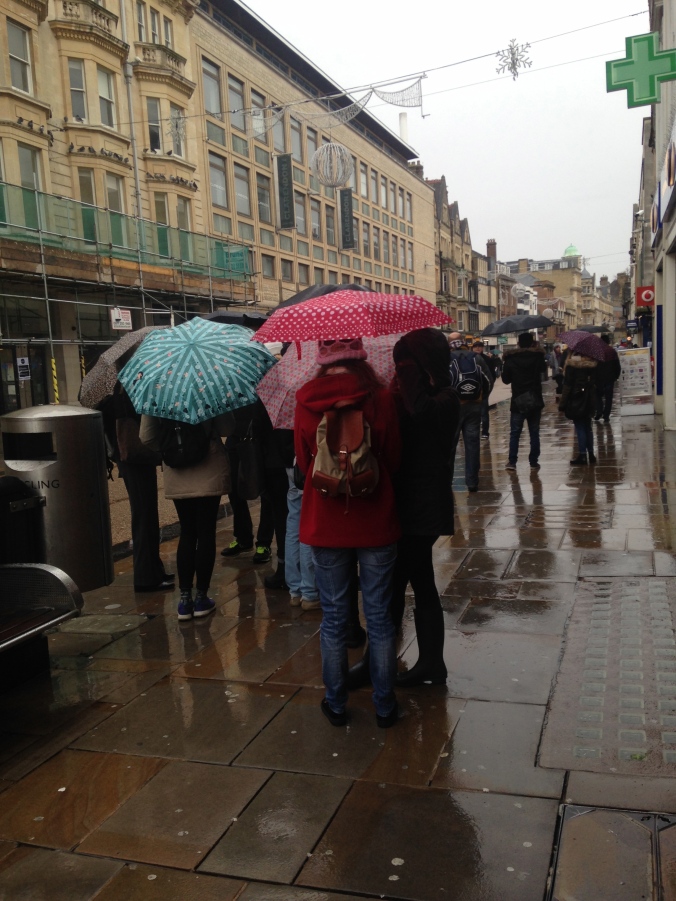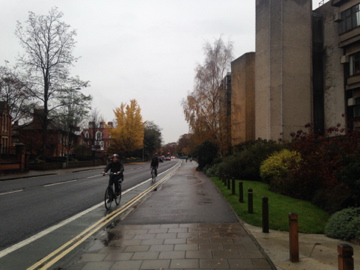
Raindrops and Sunshine… It’s been rainy a lot lately.
“Hi!” She said brightly, smiling behind the counter.
“Hello!” I replied. “How are you?”
I fiddled with my umbrella which created a smattering of round little puddles on the ground. It was a proper British rainy day.
I ordered a flat white, she recounted her day, and told me how she had found an apartment (she was househunting), and showed me the front of her trousers, which were soaked with water from the cycle ride over. We laughed together because I been rather fantastically splashed by a car earlier that day.
“So what are you studying?” she asks after a while.
For a moment, I was struck silent. I am studying theology, and I love studying theology. Still, I wondered what will she think if I say I’m studying theology?
She would probably realize I am a Christian.
I wonder what images will pop into her head with that realization. What interactions has she had with Christians before me? Were they kind? Were they pushy? Does she imagine tall ceilings, ringing with the echoes of shuffling shoes, and the scent of incense? Does she imagine judgement and vicious accusations? Bad imitations of popular music with the title of “praise-music” slapped on? Aside from all that…What kind of impression have I given to her of Christians?
I decided.
“I’m studying Theology and literature.”
***
Joy. Joyness. Joybells. Joy Joy. Joy to the World. Joysauce. Joy box. Joy to my heart. Joy down in my heart. Joybees. Joysephina. Joy bird.
It is amazing how many nick names you can create with my name. Over the years I have garnered a list longer than I can count of nick-names, puns, and songs in my honor. I suppose its the benefit of being named after an abstract concept. I often find that the mark of a new friendship is when someone makes a pun on my name, or dubs me with their own special brand of “Joy” nick names. It’s dear to me. It makes me laugh. It makes me feel loved.
I believe the propensity to name is a part of being human.
When we become closer friends with someone, we tend to give them a special name. I call my friend Elena my “Amoeba”… This may sound insulting, but trust me, it is not. To us its a term of endearment, fraught with smiles and laughter and many memories. That’s how names are; they mean something to the people who have them, and the people who give them.
We do not only give friends names; we name other things too.
Companies name products that will be memorable and definable.
We name places, streets, and landmarks.
Auto dealers name cars, and then we name them too (my cars name is “little blue”).
Historians identify periods in history by naming them according to significant events or rulers.
Philosophers name ideas.
We name things to understand and define them, and to know what sorts of things they are. We need names to identify people, objects, and concepts. Names carry meaning and emotional content, both negative and positive. Think of the name “Mr. President.” We use that name to identify who someone is: the leader of a country, or person in a position of power in a company or organization. We use the name to understand what he does, or what we expect him to do, and to say “this is what you shall do and no more.” We use that name to define him as a figure and symbol; that name holds him accountable. The name “Mr. President” carries such weight; the very name contains expectations, respect, disappointment, hope, history, partisanship, vision, memories.
Names are important.
Christian.
This is a deeply meaningful name. Christian, or “Christ-one” began as a simple name for the followers of the Jewish rabbi who was crucified, and, they said, rose from the dead. It is a name that has journeyed through generations, across continents, into dictionaries, headlines, and innumerable books. The history and evolution of the names of those who call themselves “Christians” would surely warm the cockles of any budding philologist’s heart.
When someone says “I am a Christian,” that name defines them, to others and themselves, in a deep way. It suggests a way of living, a set of beliefs, and a faith in a specific historical person. Throughout the centuries, the name has varied in language and lexicon, but the claiming of the name of Christ, the Jew, and the Nazarene has remained. The Apostles claimed that name. Francis of Assisi claimed that name. Many of the great artists and composers claimed that name. Those who promoted slavery claimed that name. Those who abolished it carried the name as well. Today, the persecuted Christians in Iraq claims it. The congregants in large shiny mega churches claim it. Small congregations in the plains of Texas claim it. Churches singing anthems of hope claim it, and churches screaming platitudes of hate claim it.
But, what does it mean for me to claim the name of “Christian”?
That morning as Amy asked me what I studied, I was momentarily held back. At first I felt guilty; Was I somehow ashamed of being a Christian?
I love Christ. I am His, and I wish to tell other of his love, love them with a love like I have been loved, tell them of the story I am a part of. What momentarily held me back was a desire to qualify what I meant by saying “I study theology.” I wanted to clear away the holy host of connotations and say,
“ My reasons for being a Christian are not because I have a political agenda, or because I want to judge people, or because I have a problem with modern science. I have never picketed at a funeral. I don’t like badly made preachy art. I don’t look down on you. I am a Christian because I love Jesus and because He makes sense of my world!”
I once heard a friend say they wished we could stop using the name “Christian” and come up with another name for Christianity, to do away with some of the negative connotations. The name of Christian carries a long history, and there are moments of that history, and even its present connotations, which are painful, ugly. Sometimes it seems like it would just be best to not associate ourselves with a name with such a heavy back story.
But I think that defeats the point of claiming to be a Christian. In choosing to be named with Christians, I am not claiming a perfect history. I could never live a life perfect enough to make the name of Christian perfect—in fact I think it’s pretty arrogant to think that we, in all our modern perfection, could make perfect the name and history of Christianity. We, like the rest of the participants in history, might have truly heroic moments, but we would also inevitably mess up. It’s an unfortunately exasperating part of being human.
That was exactly why Jesus came. Humanity, although it bears the image of its maker, can never seem to get it quite right. The whole Old Testament is a vivid story of a great and loving God giving a people His own name so that the rest of the world might know what He was like, and their desecration of that name through their rebellion, acts of injustice, and sin. They were representing the name of God badly. Christ came to show us what that name truly meant, and what the true God was really like. That is what it means to be a Christian: to claim the Christ who shows us what the name of God means. In claiming Christ, we do not say that we have everything right, but that Christ is the whole picture of God’s love, and brings wholeness to our brokenness. When I claim Christ, I claim my inadequacy, and I claim forgiveness, and I claim a future redemption.
Christ is what makes the name of Christian significant, because he shows us what it truly means. In being a Christian, I want to point people to Christ, saying “He is what it means to be a Christian.”
I think we need to keep calling ourselves Christians.
We need to call ourselves Christians to remind us that if Jesus is our Lord, at the core we are not the “intellectually-immaculate-ones” or the “socially-just-ones” or the “perfectly-good-ones.” We will never perfectly represent his name. We need to remember that our primary identity is Christ, his death and resurrection. We need to steep in the reality of being His, being “Christ’s-ones,” and let that shape our hearts and lives into the forward motion of grace.
We need to call ourselves Christians for the sake of our suffering sisters and brothers. There are Christ’s-ones around the world dying for what they believe, and for what I believe. This summer I was lucky enough to hear a talk from a woman named Baroness Cox, who lobbies in the House of Lords for persecuted people groups, and especially Christians around the world. When someone asked her what we, as comfortable Wester Christians could do to help, her answer was suprisingly simple “Pray, and help where you can of course. But most of all live your Christian life well. Others are dying for this faith that we share, the least you can do is live your life faithfully.” We must claim Christ because we are not ashamed to say we share the same faith that others are dying for.
We need call ourselves Christians for the sake of those who don’t yet know Jesus. We shape the names we are given. I cannot conceive of someone named “Seth” who is boring, because all of the Seths I have encountered are out of the ordinary, talented, and quirky people. It is the same with the name of “Christian.” With every Christian someone meets, they form a broader understanding of Christian. There have been moments of ugliness in Christian History, but there have also been moments of awe-inspiring faithfulness, bravery, creativity, and redemption. I want to be the sort of Christian who shapes peoples view of Christianity in a good way. I want people to encounter Christ in me. The sometimes negative way Christians are viewed will never be changed if Christians with integrity don’t humbly and boldly take the name and give that name a different history. For that reason, I will claim the name of “Christian” every day, and pray for the grace and humility to do it honor.
As I write this, I find myself back in the coffee shop again, and I feel a renewed conviction to be aware of the aura I am leaving with my presence. I am thankful for the name I bear.
I am studying Theology.
I am a Christian.
I am Christ’s.






